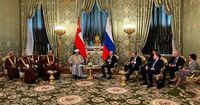In a significant boost for Egypt's economy, the investment portfolio of the International Finance Corporation (IFC), a member of the World Bank Group, reached $2.4 billion as of March 2025. This announcement was made by Dr. Rania Al-Mashat, Egypt's Minister of International Cooperation, during the spring meetings of 2025 held in Washington, D.C.
Dr. Al-Mashat met with Makhtar Diop, the President of the IFC, to discuss the ongoing collaboration aimed at enhancing the role of the private sector in the nation's development efforts. The discussions focused on various sectors including transportation, logistics, advanced technology, and dual industries, all critical for Egypt's economic growth.
"Our partnership with the IFC is vital for supporting growth and job creation led by the private sector," Dr. Al-Mashat stated. She emphasized that the upcoming visit of Diop to Egypt in June presents a timely opportunity to evaluate the progress of their partnership and encourage further collaboration.
The partnership aligns with Egypt's broader economic development strategy initiated in June 2023, which aims to implement a state ownership policy and promote economic growth driven by private sector initiatives. This strategy highlights the government's commitment to restoring the role of both local and foreign private sectors in leading economic development.
As part of this initiative, the current investment portfolio of the IFC in Egypt includes not only direct investments worth $2.4 billion but also a technical assistance and advisory portfolio valued at $25.7 million. These investments span across vital sectors such as financial markets, agriculture, health, education, manufacturing, tourism, retail, construction, and infrastructure.
Dr. Al-Mashat also pointed out the cooperation with the European Union, which has established investment guarantees amounting to €1.8 billion. She noted the importance of the IFC's involvement in expanding these guarantees to attract even more foreign direct investments to Egypt.
"The collaboration between Egypt and the World Bank to prepare a 'business readiness' report is crucial. This report evaluates the investment climate and business environment in Egypt, which will positively impact the IFC's operations and open new avenues for joint cooperation," Dr. Al-Mashat explained.
Moreover, discussions included enhancing investments in the renewable energy sector, specifically focusing on the Norwegian company Scatec. The government is keen on expanding investments to support Egypt's electricity grid, given the vital role of renewable energy in the country’s future.
Notably, the IFC has played a pivotal role in attracting private sector investments in essential sectors like renewable energy. The organization has led a consortium of investors to inject $653 million into the Benban solar energy project, one of the largest solar installations in the world.
Diop reiterated the IFC's commitment to expanding its operations in Egypt, not only by encouraging investments from Egyptian companies but also by attracting foreign firms to invest in the country. He mentioned that discussions are ongoing with several international investors interested in entering the Egyptian market.
This growing investment momentum is seen as a crucial factor in Egypt's economic recovery and growth strategy, especially in light of the challenges posed by global economic uncertainties. By fostering a competitive investment environment, Egypt aims to position itself as a preferred destination for foreign investments.
The collaboration between the Egyptian government and the IFC is expected to yield significant dividends, not just in terms of financial inflow but also in enhancing the overall business environment, which is essential for sustainable economic growth.
As Egypt prepares for the upcoming visit from the IFC president, stakeholders are optimistic about the potential for increased collaboration that could lead to more robust economic outcomes. The focus on private sector involvement is seen as a cornerstone of Egypt's strategy to revitalize its economy and achieve sustainable growth.
In conclusion, the partnership with the IFC represents a strategic move for Egypt as it seeks to leverage international investments to bolster its economic framework and improve the living standards of its citizens.



